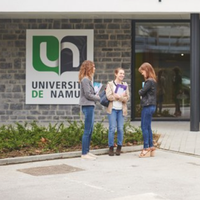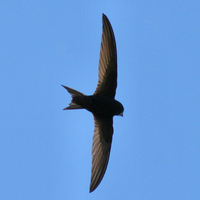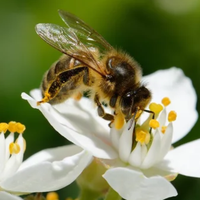The CanDLE calls
The first and second Campus Namur Durable (CaNDLE) calls contributed, in 2013 and 2015, to eight CanDLE projects likely to improve the sustainability of the campus or university activity. More information (in French) here...
The 2021 call enabled the launch of five new eco-responsible initiatives proposed by UNamur members and financed by the Jerome Fund for Sustainable Development.
 Biodiversity and conviviality near the vauban auditorium
Biodiversity and conviviality near the vauban auditorium
This project, supported by the Assembly of Project Student residences (Kots à projets), is part of an initiative to create a conviviality zone near the buildings housing the fifteen or so UNamur student residences, near the Vauban amphitheatre. The programme includes the installation of picnic tables, the creation of a hedge of small fruit trees, the sowing of a flowering meadow, the installation of an insect hotel, the planting of trellised fruit trees, the creation of a collective compost... A green space designed and created for and by students, which will also be a refuge for birds and insects.
Project leaders: Assemblée des Kots à Projets (AKàP - Hadrien Dricot and Antoine Baetslé), in partnership with the spin-off e-biom (Jonathan Marescaux).
 Apus on campus
Apus on campus
The decline of black swift (Apus apus) populations has been observed in Wallonia for the past thirty years. On the initiative of members of the Laboratory of Evolutionary Genetics and Ecology (LEGE), and in collaboration with the non-profit organisation Natagora, 30 nests will be installed on the campus to encourage the return of these migratory birds. These shelters will also contribute to the protection of other cave-dwelling species, such as the house sparrow, the black redstart and certain bats. An awareness-raising component will be put in place to inform the public about this initiative, which echoes the installation of 34 swallow nests in the Rue de Bruxelles in April 2021. Read more...
Project leaders: Jérémy Berthe, Boris Hespeels, Martin Vastrade (URBE/LEGE), Marie-Laurence Hubin (URBE), in collaboration with the non-profit organisation Natagora (Martine Wauters).
 May'AGE: an apiary in the city
May'AGE: an apiary in the city
Respect for ecosystems through sustainable and local food is at the heart of this project, initiated within the Service for Life on the campus (VéCU - Carmel project) and supported by the General Assembly of Students (AGE). The objective is to transform the garden of the Carmel in Jambes, which is a student residence, into a flower meadow and an apiary, favouring an indigenous and endangered species of bee (Apis mellifera mellifera). The Fonds Jérôme will finance the purchase of seeds, hives, beekeeping equipment and clothing, training and the creation of educational panels for awareness-raising activities around the apiary.
The project leaders: General Assembly of Students, in partnership with Camille Calicis, researcher at the Education and Technology Department (IRDENa Institute), beekeeping trainer.
 A zero waste laboratory in URVI
A zero waste laboratory in URVI
Laboratory research generates a large amount of single-use plastic waste, as equipment must be clean or sterile. The Integrated Veterinary Research Unit (URVI) is gradually replacing these costly and polluting plastic supplies with their glass counterparts, which are washable, recyclable and ultimately more economical. In this context, the laboratory will complete its glassware collection and acquire a hot air steriliser that will allow it to be used without risk of contamination and for all types of manipulation (microbiology, virology, cell culture, etc.). A pilot project likely to be a driving force for change and transition in UNamur's laboratories.
Project leaders: Benoît Muylkens, Nicolas Gillet, Damien Coupeau, Laetitia Wiggers and Hélène Dumont (URVI).
 Teaching Better training for students on transition and responsible management issues
Teaching Better training for students on transition and responsible management issues
This project is based on the Master's programme in management sciences, which trains the managers and entrepreneurs of tomorrow. Carried out in collaboration with UCLouvain, it will analyse the social representations of students on sustainable development, transition and corporate social responsibility, and the way in which these concepts are integrated by professors into their courses. What is the objective? To measure the impact of teaching on the evolution of students' representations and to propose concrete pedagogical adaptations that will allow for the reinforcement of training on these important issues for education in responsible management.
The project leaders: Sophie Pondeville (Faculty of Economic, Social and Management Sciences, IRDENa) and Oscar Bernal (Department of Management, DeFIPP) at UNamur, in partnership with Valérie Swaen (Louvain School of Management, LouRIM) at UCLouvain.















